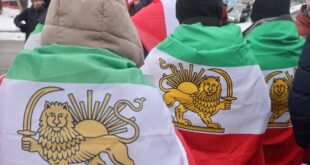 TEHRAN (Fars News Agency)- Frantic efforts are under way in Washington and London to find an exit strategy for Iraq as a renewed surge in violence led George Bush to admit Friday that tactics there might need to change. Diplomats and politicians in both capitals are desperately reviewing and debating options that were once regarded as unthinkable.
TEHRAN (Fars News Agency)- Frantic efforts are under way in Washington and London to find an exit strategy for Iraq as a renewed surge in violence led George Bush to admit Friday that tactics there might need to change. Diplomats and politicians in both capitals are desperately reviewing and debating options that were once regarded as unthinkable.
The review was given added urgency Friday when 800 gunmen ran amok in Amara, a town transferred by the British to Iraqi control two months ago.
A source in the Amara police department said 30 officers and 20 civilians had been killed when the gunmen overran police stations and set up roadblocks. About 500 British soldiers were last night on standby to go back in.
In Washington, Mr. Bush said he would consult his top military commanders in Iraq on Saturday over whether a change of tactics was necessary. But the president, who is under intense pressure to rethink his Iraq strategy if not his whole approach to foreign policy, said talks with the generals would only concern tactics, not strategy.
“We are constantly adjusting tactics so we can achieve our objectives and right now, it’s tough,” the president admitted.
With 74 American soldiers already dead in Iraq in October, it is likely to be the worst month for U.S. forces in two years. U.S. officers admitted on Thursday that the effort to pacify the capital, the Baghdad Initiative, had failed.
Pressure for a change of strategy is partly the result of leaks from a review from a study group set up by the former U.S. secretary of state, James Baker, at Mr. Bush’s request. The leaks from Mr. Baker’s Iraq Study Group (ISG), which is due to report after next month’s Congressional elections, suggest it will recommend a fundamental change of course.
The Foreign Office is conducting a review in tandem with Mr. Baker. UK officials said the Foreign Office was “beavering away” on about half a dozen options, roughly the same as those considered by the ISG. One official said discussions were proceeding at “a high tempo”.
Among the changes the ISG is expected to recommend is the opening of talks on Iraq’s future with Syria and Iran, countries the White House has sought to isolate.
“The failure of the Baghdad initiative is convincing evidence that a military solution is not going to work,” said Larry Diamond, a former adviser to the U.S.-led occupation authority in Baghdad who also advised the ISG. “We should be talking to neighboring Arab states and we think we should be talking to Iran – to broker the compromises which might save the situation,” Mr. Diamond told the Guardian.
Other options being considered are a redeployment of forces to “super-bases” in Iraq or bases outside the country, pressuring the Baghdad government to find a fairer way of sharing Iraq’s oil wealth to give Sunnis a better deal, and even the partitioning of the country into autonomous Kurdish, Sunni and Shiite regions – an idea the White House has dismissed as a “non-starter”.
British diplomats, including Dominic Asquith, the ambassador to Iraq, and Sir David Manning, ambassador to Washington, have contributed to the ISG.
The Foreign Office is backing the ISG proposal to engage with Iran and Syria. “We are encouraging them to go with that,” a Foreign Office source said.
The Foreign Office has ruled out an immediate unilateral British pull-out and partition. It basically favors a continuation of the present policy, but is agonizing over whether to press for a timetable, possibly even a secret one, for withdrawal. “Every policy option I could lay out for you would be worse than what we are doing now,” a British official said.
 Eurasia Press & News
Eurasia Press & News



